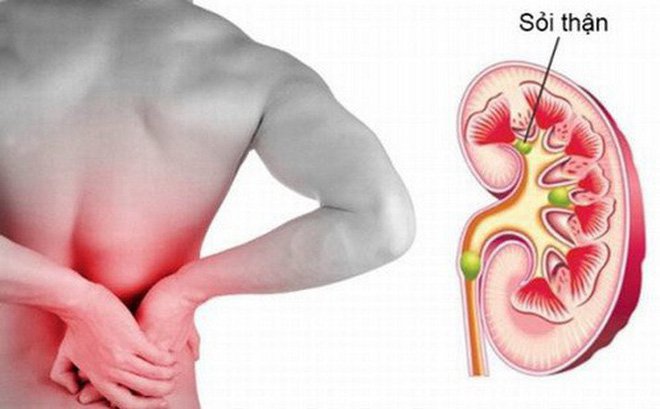Endoscopic laser lithotripsy: Can dissolve large stones without damaging the ureter
The article is expertly consulted by Assoc. Prof. TS.BS Tran Le Linh Phuong - Director and Head of General Surgery Department, Vinmec Nha Trang International General Hospital.
In the current methods of treating ureteral stones, endoscopic laser lithotripsy is one of the most advanced treatment methods. This method offers the hope of thoroughly treating ureteral stones, non-invasively, dissolving large stones, without causing damage to the ureter.
1. What is endoscopic laser lithotripsy?
Currently, the trend of less invasive treatment and application of high technology is gradually replacing open surgical methods. In particular, endoscopic laser lithotripsy is the leading method of advanced ureteral stone treatment.
Laser retrograde endoscopic ureteral lithotripsy using a lithotripsy is a device that performs the procedure of complete percutaneous kidney stone dissolution with a skin incision of about 1cm, helping doctors to successfully perform stone cases. difficult ureter. The outstanding advantage of the lithotripsy machine is that it can stop bleeding well and cause necrosis at the lowest level of surrounding cells.
2. Advantages of endoscopic laser lithotripsy
Some notable advantages of endoscopic laser lithotripsy can be listed as:
Can dissolve all types of stones, including those of large size and located in difficult positions. Make sure the gravel is clean. The time of lithotripsy is fast, averaging only about 30 minutes. Fast recovery: The patient can be discharged from the hospital after 1 day of follow-up and can perform all normal personal activities within the first day after surgery. Safe, does not leave scars, does not worry about complications, reduces pain for patients. The routine technique is minimally invasive, follows a natural path, and does not cause damage to the ureter. Cost of surgery is reasonable, sometimes even lower than conventional open surgery. However, endoscopic laser lithotripsy still has some limitations such as:
Not applicable in the case of patients with urethral stricture in men, narrowing of the long ureter under the stone, patients with coagulation disorders. . Relative contraindications for severe urinary tract infections, grade III, IV hydronephrosis. Stones may not be accessible in the presence of ureteral stricture, but this condition is rare. Although minimized, damage to the ureter can still occur, but most are not cause for concern.

Nội soi tán sỏi niệu quản bằng laser có thể tán được mọi loại sỏi, cả những sỏi có kích thước lớn và nằm ở vị trí khó
3. Endoscopic laser lithotripsy when?
Despite providing superior treatment efficacy and safety compared to traditional treatment methods, patients still need to be carefully examined whether to perform endoscopic laser lithotripsy or not.
This method is indicated and recommended in the following cases:
Middle and lower third ureteral stones with stone size from 0.6 cm - 2 cm and failure of medical treatment or extracorporeal dilation. kidneys are still functional. Small ureteral stones < 0.5 cm with medical treatment for 1 week without clinical improvement, stones do not move to a lower position, stones on ureteral strictures, stones on polyps. With the semi-rigid endoscope, it is possible to endoscopically dissect the stones located in the upper third of the ureter for women, even though the position is close to the renal pelvis, and for men, it should be applied to stones in the low position. than. Ureteral stone on the site of ureteral prolapse. Contraindications for endoscopic laser lithotripsy include:
Patients with urethral stricture in men, patients with long ureteral stricture under the stone. Untreated urinary tract infections. The patient has a blood clotting disorder, is being treated for a clotting disorder, is taking anticoagulants. Patients with renal failure, kidney failure. With contraindications for endoscopic laser lithotripsy, patients can be treated for related pathologies before performing or have to switch to traditional treatment methods.
4. Where is the best place to use laser ureteral lithotripsy?

Nội soi tán sỏi niệu quản tại Bệnh viện Đa khoa Quốc tế Vinmec
Endoscopic laser lithotripsy is currently being performed routinely at Vinmec Nha Trang International Hospital. This technique is trusted thanks to its success rate up to 95%, complications less than 5% and can be even smaller if performed in good quality hospitals.
In Vinmec Nha Trang, endoscopic laser lithotripsy has successfully treated many patients with ureteral stones in the past 3 years, with the advantage of surgery being minimal intervention, small incisions, Quick recovery, short hospital stay.
This technique is performed by a team of doctors who are leading experts in urology, which are:
Assoc. Pharmacy in Ho Chi Minh City, Head of Urology Department, University of Medicine and Pharmacy Hospital, Ho Chi Minh City. Ho Chi Minh City, is one of the leading experts in Vietnam in the field of urology MS.BS Le Phuc Lien: Doctor Lien with more than 12 years of experience in the field of urology and specialized urology, successfully implemented many advanced techniques such as urology endoscopy, urology, urodynamics, neurogenic bladder. In addition, Vinmec Nha Trang invests in the most modern laparoscopic surgery machines and laser lithotripsy machines in the region, and international quality surgical instruments.
Để đặt lịch khám tại viện, Quý khách vui lòng bấm số HOTLINE hoặc đặt lịch trực tiếp TẠI ĐÂY. Tải và đặt lịch khám tự động trên ứng dụng MyVinmec để quản lý, theo dõi lịch và đặt hẹn mọi lúc mọi nơi ngay trên ứng dụng.






